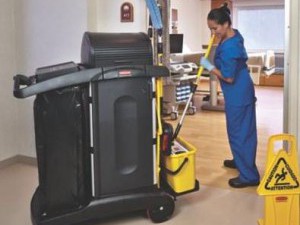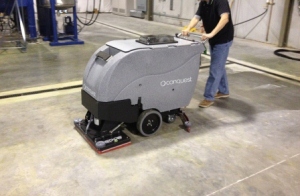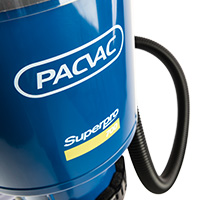
Having witnessed first-hand the devastation that foot-and-mouth disease (FMD) caused in the United Kingdom in 2001, infectious diseases expert Dr Gavin Macgregor-Skinner pulls no punches about what such an outbreak would mean for Australia.
“This would be such a devastating disease if it comes into Australia,” he says.
“It would close down communities. It would stop supply chains. It would affect the agricultural sector and the non-agricultural sector. Any compensation would never be enough.”
The threat has suddenly become very real. Since the first case of FMD was identified in Indonesia at the start of May, the virus has spread quickly, with hundreds of thousands of cases being reported, including in the tourism haven of Bali.
The crisis has triggered fears that FMD could spread to Australia via travellers and meat imports. Estimates suggest that an outbreak in Australia could cost the economy $80 billion over a 10-year period1.
Dr Macgregor-Skinner, director of the Global Biorisk Advisory Council (GBAC), a division of ISSA, is calling on governments, citizens, and the cleaning and hygiene community to do their bit to combat the disease.
He also believes moves to clean and disinfect shoes at international airports in an attempt to stop the transmission of FMD into Australia should act as a prompt for similar disease-fighting measures in other parts of the community, including in hospitals and aged-care facilities.
“When we go into hospitals and examine drug-resistant bacteria such as MRSA, E. coli and flagella, we find that it walks around on shoes all over the place, but no one cleans their shoes in hospitals.”
A national threat
FMD is a highly contagious disease that affects cloven-hoofed animals, including cattle, sheep, goats, deer, and pigs.
Symptoms include painful lesions on the feet and in the mouth that may cause fever, drooling and prevent the animal from eating and drinking.
Most commonly found in the Middle East, Africa, Asia and South America, FMD has not been diagnosed in Australia since 1872. The greatest risk of it entering Australia stems from imported meat products and transmission from international travellers as they re-enter the country.
Associate Professor Greg Whiteley, executive chairman of Whiteley and a world-renowned expert on infection prevention and control, says while it could be possible to isolate FMD if it were detected in Australia’s livestock, he fears that transmission into the feral animal community would see cases spiral out of control.
In addition to any health threat, Dr Whiteley believes the spectre of FMD, COVID-19 and other infectious diseases poses possible legal consequences for Australian hospitals, healthcare facilities and cleaning companies if their facilities or workers were found to be the mechanism of transmission.
“They’ll get sued and that will bring a whole pile of grief to them because they’ll probably fall over under the weight of a class action, especially if it’s one of the exotic viruses,” he says. “Their insurers will step up, but it will be hard to recover.”
To counter such a hazard, Dr Whiteley says cleaning and hygiene specialists should focus on:
- ensuring their systems and quality assurance practices are sound
- training their staff appropriately to deal with infection risks
- monitoring and measuring their sanitation performance and outcomes.
“Because if they’re not, they’re toast,” Dr Whiteley says.
Fighting back
While stating that Australia’s biosecurity system is one of the strictest in the world, Minister for Agriculture Murray Watt has conceded that there is “no biosecurity silver bullet” for FMD.
“Our biosecurity controls rely on a multi-layered approach to mitigate the risk of FMD,” Watt says in a media release.
Passengers arriving in Australia from Indonesia have been directed to clean their shoes using sanitation foot mats – which contain a citric acid solution – at airports and ports.
Additional detector dogs have also been put to work in airports to stop people trying to bring pork or beef into the country. Other measures include passenger declarations, profiling of passengers entering from Indonesia, real-time risk assessments and questioning.
“If we’re really serious, we should be getting every shoe that comes in from Bali or Indonesia and disinfecting them,” Dr Whiteley says.
“The virus is hard to kill. It’s not something that you can give a little bit of a spray and a squirt and away you go. This is a vigorous virus, and you need to step up the level of disinfection.”
He suggests that a sterilant such as peracetic acid could be used, as well as hydrogen peroxide or aldehydes.
“But you have to be careful with both hydrogen peroxide and all of the aldehydes because of health, safety and environmental issues.”
Fallout from the FMD outbreak in the UK just over two decades ago underlines the importance of being diligent. The disaster cost the economy about $13 billion and resulted in many millions of animals being destroyed and incinerated2. Many farmers also committed suicide after losing their livestock and livelihoods.
Working there at the time, Dr Macgregor-Skinner recalls that mass lockdowns in farming zones and the deployment of cleaning and disinfection teams came unstuck because of one oversight. After initially being baffled as to how FMD was spreading, infectious disease specialists did swabs of postal-service vehicles.
“We found the virus everywhere,” Dr Macgregor-Skinner says.
“Up to that point, we’d missed the postman.”
Team effort
The lesson for Australia and other countries, according to Dr Macgregor-Skinner, is that it takes a whole-of-community response to combat serious diseases, whether it is FMD, COVID-19, or other viruses.
He notes that, aside from FMD, countries around the world are experiencing out-of-season outbreaks of diseases and illnesses that have confounded health experts.
This includes adenoviruses in Australia and the United States, respiratory syncytial viruses in various part of the world, and the highly publicised spread of the monkeypox virus that has now been found in about 65 countries.
Given such a scenario, Dr Whiteley says border control officers, health experts and cleaning and hygiene contractors must be on high alert as they potentially come into contact with FMD and other viruses.
The focus should be on correctly donning and doffing PPE gear as part of what is called an aseptic technique that protects workers from contact with blood, body fluids and body tissue.
“If you muck that up, the stuff that’s on the outside suddenly ends up on your hands or on your shoes and you’ve become the mechanism by which transmission can occur,” he says.
Ultimately, Dr Whiteley says good disinfection and hygiene comes down to robust cleaning systems and methods.
“Of course, you need to use the right materials, but it’s really about the methods. If you get your methods wrong, you’ll make the situation worse.”
As part of their education, Dr Whiteley encourages cleaners and others to become familiar with the Australian Veterinary Emergency Plan (AUSVETPLAN), which outlines the nationally agreed approach for the response to emergency animal disease incidents in Australia. It also advises on appropriate disinfectants that can be used for different cases.
Dr Whiteley also urges industry professionals to get GBAC STAR accreditation that provides third-party validation of a building service contractor’s cleaning, disinfection and infection prevention protocols and procedures.
Play it safe
As Australia seeks to keep its borders free of FMD and other diseases, Dr Macgregor-Skinner hopes governments and other authorities will ramp up campaigns to educate travellers about food, products and equipment that they should not bring into the country.
This should include a call to action for them to clean shoes, camping equipment, bicycle wheels and other possible carriers of disease before they hit Australian soil.
“That message should be coming out every two weeks or so where we say, ‘Hey guys, here’s a quick reminder about how to clean the tyres on your mountain bike or whatever the case may be.”
Dr Macgregor-Skinner is frustrated that a lot of FMD fact sheets are being loaded on to federal and state government agricultural websites that are unlikely to be read by younger travellers. Instead, they should go on travel and tourism sites.
Likewise, he thinks travellers’ incoming passenger cards are largely irrelevant because most people are unlikely to make truthful declarations as they pass through border controls.
A better option would be to have biosecurity officers conduct inspections and ask specific questions of travellers before they enter the country.
“The incoming passenger card is a nice thing, but it’s useless,” he says.
“You’ve got to be more active and interactive than that. You have to talk to people and let them know that if they bring in FMD they are going to wipe out whole industries.”
This article first appeared in the November/December issue of INCLEAN magazine. Read the original article here.
[sources]
1 https://minister.agriculture.gov.au/watt/media-releases/fmd-foot-mats



